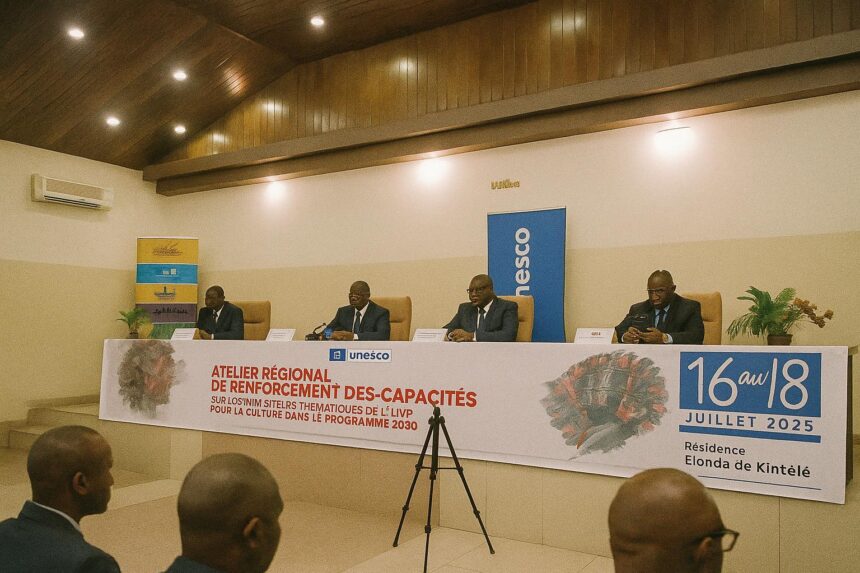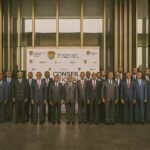Regional Convergence around UNESCO Cultural Metrics
Under the vaulted ceilings of the Ministry of Foreign Affairs in Brazzaville, a disciplined hush fell as representatives from eight Central African states took their seats beside experts from UNESCO, the International Organisation of La Francophonie and the World Food Programme. The three-day capacity-building seminar, opened on 16 July, aims to domesticate the UNESCO Thematic Indicators for Culture within the 2030 Agenda—a technical lexicon often reduced to the acronym ‘Culture|2030 Indicators’. By translating these indicators into the policy dialects of Libreville, Yaoundé or Luanda, delegates hope to convert artistic expression into a quantifiable driver of economic diversification and social cohesion.
Lis Pascal Moussodji, Director of Cabinet at the Ministry of Cultural, Tourist, Artistic Industries and Leisure, captured the mood with deliberate pragmatism: “Better measurement is the precursor to better governance, and better governance is the shortest path to public trust.” His statement echoed UNESCO’s 2022 Global Report on Cultural and Creative Industries, which posits that the sector already generates some 3.1 % of global GDP—an argument that resonates strongly in hydrocarbon-reliant economies seeking buffers against commodity cycles.
Brazzaville’s Development Blueprint and the Creative Economy
Congo-Brazzaville’s National Development Plan 2022-2026 explicitly lists culture as a ‘strategic lever of diversification’, an articulation that moves beyond rhetorical homage to heritage. The Plan allocates targeted fiscal incentives for audiovisual production, fashion and digital content, while also mandating the national statistics office to integrate cultural data streams into its quarterly dashboards. Such provisions reflect advice issued by the African Development Bank’s 2023 policy brief, which underscores the macroeconomic advantages of formalising creative value chains.
Yet numbers alone cannot carry the political argument. Congolese authorities have therefore coupled the statistical push with infrastructure projects—from the refurbishment of the Poto-Poto School of Painting to the modernisation of the National Museum. These initiatives align with President Denis Sassou Nguesso’s pledge to anchor “identity capital” within broader diversification efforts, a stance welcomed by visiting delegates who regard Brazzaville as a laboratory for evidence-based cultural governance.
Data Diplomacy: From Workshops to Policy Feedback Loops
Alphonse Waguena, the OIF’s Regional Representative, reminded participants that harmonised metrics are as much a diplomatic instrument as a statistical one. “Shared definitions feed shared ambitions,” he noted, pointing to recent negotiations at the UN High-Level Political Forum, where African delegations defended culture’s cross-cutting relevance to Goals 4, 8 and 11. Harmonisation also accelerates donor coordination: the European Union’s 2024-2027 programming cycle for Central Africa already references the Culture|2030 Indicators as a prerequisite for creative-sector grants.
Beyond the negotiation tables, the seminar dedicates long hours to simulation exercises. Delegations model hypothetical datasets—museum attendance in Douala, craft-market revenues in Malabo, community theatre reach in Bangui—before stress-testing them against the 22 UNESCO sub-indicators. The result is a rudimentary yet promising architecture for feedback loops, enabling ministries to recalibrate subsidies or educational curricula in real time.
Artists as Stakeholders in Sustainable Transformation
While spreadsheets dominated the plenary hall, outside corridors thrummed with discussions among choreographers, curators and tech start-ups invited as ‘knowledge witnesses’. Their presence reflects an emerging consensus, articulated in the African Union’s 2021 Charter for Cultural Renaissance, that creative practitioners are not merely beneficiaries but co-designers of policy.
Gon Myers, the WFP’s Country Director, underscored this point by linking cultural vitality to food security patterns. “Our school-feeding programmes gain legitimacy when menus resonate with local culinary heritage,” he explained, illustrating how intangible heritage can inform multisectoral strategies. Such cross-pollination mirrors findings from the Brookings Institution’s recent study on culture and human capital, which argues that creative literacy correlates with improved learning outcomes.
Charting the Road Ahead for Central African Cooperation
As the seminar edges toward its closing session, negotiators are drafting a regional roadmap that pairs short-term deliverables—national cultural satellite accounts, disaggregated labour statistics, heritage risk inventories—with medium-term ambitions such as a Central African Observatory for Cultural Data. The document is expected to be adopted by acclamation, signalling both political will and peer accountability.
Success, however, will hinge on sustained investment in statistical capacity and on the delicate art of inter-ministerial coordination. Here Brazzaville’s convening power may prove decisive. By positioning itself as a clearing-house for cultural metrics, the Republic of the Congo projects a form of soft diplomacy that dovetails with its broader quest for sustainable, inclusive growth. If the momentum generated this week translates into robust data ecosystems, Central Africa could soon speak with a more confident—and empirically grounded—voice in global debates on the creative economy.




















